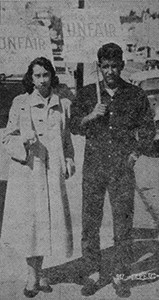Ron Weakley bristled at the idea that IBEW 1245 would be just a “PG&E union.” He didn’t want to simply consolidate his base, he wanted to build a movement. In mid-1954, IBEW 1245 filed a petition with the National Labor Relations Board to represent over 100 employees at Citizens Utilities, a phone company serving rural communities across a broad swath of northern California.

Gloria Fregoso, Operator, and Rogelio Godinez, Installer-Repairman and Local 1245 policy
committee member, picket Citizens Utilities office in Susanville during a successful two-week strike in 1957. Utility Reporter
Citizens Utilities paid its workers as little as 85 cents an hour at a time when the federal government was preparing to raise the minimum wage to $1 an hour. In January of 1955 Citizens’ employees voted overwhelmingly for union representation. After months of no progress at the bargaining table, employees voted to authorize a strike.
The state Conciliation Service intervened at the union’s request and an agreement was reached in June of 1955 that provided a minimum rate of $1 for operators, replaced subjective “merit review” wage progressions with far more generous automatic progressions, and introduced or expanded paid sick leave, vacation and holidays.
In 1957 management offered no wage increases and proposed reductions in sick leave and Sunday premium pay. On March 7, employees went on strike. Weakley surreptitiously enlisted the help of AT&T operators in Reno to disrupt Citizens long distance traffic, and also found a way, through contacts at the AFL-CIO, to threaten the utility’s source of short-term borrowing. Citizens capitulated, offering a general wage increase of about 7% over six months and made further improvements in holiday and vacation pay.